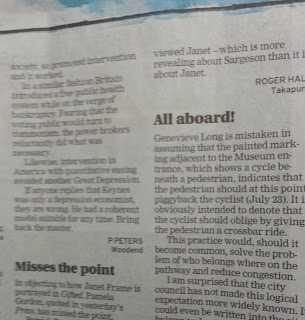'more revealing about Sargeson than it is about Janet' - Roger Hall talking about Gifted by Patrick Evans
(please note above, the classic identifier of sexism in language usage: the female author is referred to by her first name 'Janet' while the male author is given his surname 'Sargeson')
In a Letter to the Editor of the Christchurch Press, published on Wednesday 24 July 2013, prominent New Zealand playwright Roger Hall claims that I have 'missed the point' in my criticism of the play Gifted.
He points out that we don't actually learn so much about Janet Frame from the play, than we actually learn about how she appeared to Frank Sargeson.
For my part, I think that Roger Hall has 'missed the point' of my objections to the misleading publicity for the play. I did in fact know that in the novel Gifted the misogynist portrait of the fictional Janet Frame is filtered through the perceptions of a fictional Frank Sargeson, and I told the reporter this.
The news report seriously misrepresented my opposition to the play, as so often happens when we have recourse to the media. My emotion as a distressed family member upset by an injustice being done to a loved one, was rendered vividly, but the valid objections I raised were suppressed.
I objected to the fact that Gifted is being promoted as if it were historically accurate, and as if it were a 'tribute' to Frame. There is an actor playing 'Janet Frame' and an advertising poster with a painting based on a real photograph of Frame. This is the basis for my objection: that the public is not being told that major verifiable historical facts have been changed by Patrick Evans.
Hall seems to think that even though we don't learn about the real Janet Frame, that we do learn about the real Frank Sargeson. So his letter, above, adds to the fog of misrepresentation. We learn about neither; we do learn a lot about the playwright Patrick Evans, however.
Evans himself believes his distorted portrait of Frame, with major biographical facts changed and her 'behaviour' distorted through the lens of Sargeson's neuroticism, is more realistic than the Frame revealed by her own autobiography, or the Frame presented by Michael King's biography.
'Evans has rejected the deceits of formal biography', says one of his supporters.
We gain insight into the 'real' Frame by telling deliberate untruths about her? I don't think so.
Even though I disagree with him, I do appreciate Roger Hall's letter, because out of all the stringent criticisms I received for opposing the use of a fake Janet Frame quote, his was the only one that did not attack me ad hominem, but that at least tried to engage with the critique he had thought that I had made. Many others instead ignored the issues and tried to discredit me as a person by repeating malicious gossip and making slanderous accusations about my professional role, and questioning my right to speak up at all, while at the same time, ironically, accusing me of being the 'totalitarian'.
Roger Hall is right that one hardly learns anything about Janet Frame from this play. But it seems that many in the audiences have indeed 'missed the point' that he so aptly makes. It is clear from their tweets and their reviews that they have walked away from the play feeling that they have viewed an accurate portrait of Janet Frame.
Some of the reviewers admit to having started from a point of almost complete ignorance about either of the prominent NZ authors lampooned by the play. Despite their unfamiliarity with the biographies of Sargeson and Frame, they can still apparently recognise a 'brilliant' or 'moving' portrayal of them, which is intriguing.
'Beth' said: 'As the show began, I was embarrassed to admit that I knew very little of the two writers portrayed, Janet Frame and Frank Sargeson.' But her eyes were soon opened to their real nature: 'Frank seemed so real, so charismatic, so profoundly kiwi, which contrasted perfectly with the mysterious and sometimes completely absurd character of Janet.'" Youth Ambassador Review
Chalk one up for Patrick Evans, who has managed to sway one more person to his own point of view that Frame was evasive, out of touch with reality, and generally bonkers. The historical facts do not support this opinion, which is why Evans has had to distort them.
Elizabeth O'Connor reports that 'Frank Sargeson, the “father of New Zealand fiction”, finds his house, garden and shed semi-invaded by a Janet Frame who is only just beginning to find articulation as a person, never mind a writer.' Another reviewer obviously ignorant of the fact that Frame was already an accomplished and prize-winning author long before she even met Sargeson, and if this play had done her any justice it would certainly have represented the dazzling communicative wit and wisdom she is on record as being capable of, rather than attributing to her only what Patrick Evans referred to in a recent interview as "schizophrenic word salad".
Another reviewer, Alan Scott (Christchurch Press) in a report that can only be described as effusive, found that the play 'captured so acutely and so accurately a certain period in New Zealand literary history'. I hope that Roger Hall will write to the Editor immediately to slap Mr Scott on the wrist for 'missing the point'. There was certainly no 'accuracy' concerning the historical details of this moment in literary history - these were all rendered a-jumble by Patrick Evans. And anyway, it was Frank we were learning about, not Janet, wasn't it, Roger?
See also:

No comments:
Post a Comment